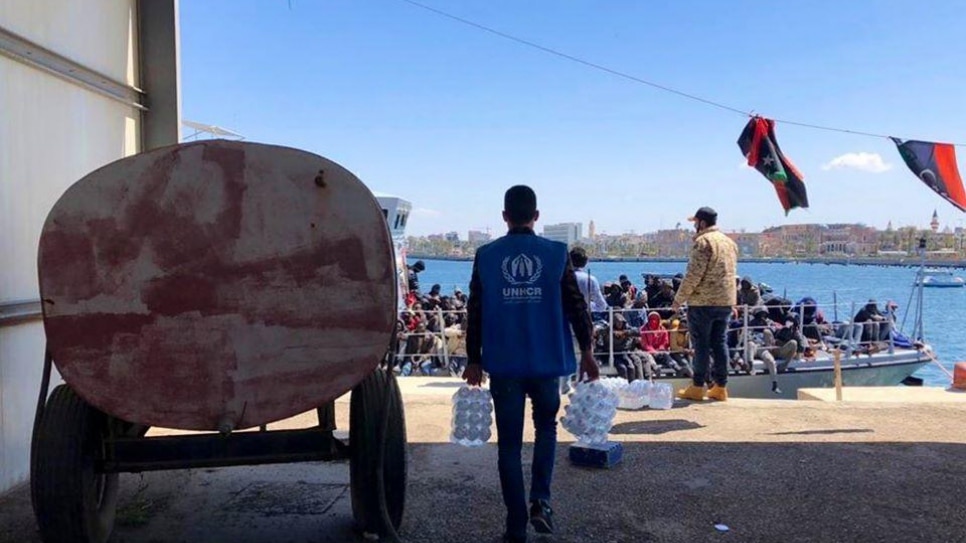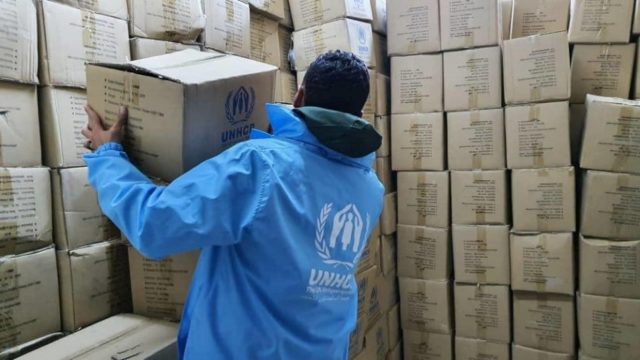
UNHCR staff distribute bottled water to refugees and migrants whose vessel was intercepted attempting to cross the Mediterranean Sea and returned to Libya on April 9. © UNHCR/Noor Elshin
A Sudanese teenager survived brushes with death in a quest for asylum, but rising insecurity and COVID-19 restrictions drove him to risk all on the open seas.
Since before he can remember, 18-year-old Siddik’s* life has been shaped by violence, hardship and displacement. He was just a baby when fighting in Sudan’s Darfur region forced his family from their home, and only seven when he lost his mother to the conflict.
As a youngster he applied himself to his studies in the hope of attending university and being able to provide for his three siblings and blind father. But when armed groups came to his school to forcefully recruit boys to fight, he ran home, leaving his education behind for good.
Desperate to find a way to put food on the family’s table, he left Darfur at the age of 16. He had just a few bank notes in his pocket and a single goal: to quickly find work and send money back home.
“I wanted to travel to be able to provide for them, so that they can get an education unlike me,” Siddik said of his younger siblings. “I want them to have a better life than I had”.
His journey led him to Libya, where tragedy again caught up with him. Soon after arriving in the country, Siddik was taken into detention, and in July last year he was in Tajoura Detention Centre when it was hit by a series of airstrikes targeting the hangar where he was living with more than 150 other men. Many of the friends he had made were killed or injured. Altogether, the attack left more than 50 dead.
- See also: UN agencies warn conflict and the COVID-19 pandemic present a significant threat to life in Libya
After months of trying unsuccessfully to make ends meet in Tripoli and still determined to make a better life for himself and his family, Siddik saved up enough money to risk the perilous sea crossing to Europe.
More than 46,000 refugees and asylum-seekers are currently registered in Libya, where many face life-threatening insecurity, instability, dire economic conditions and the threat of exploitation and abuse by criminal gangs and armed groups.
Along with a sharp escalation in fighting in the past month, the country has also recorded its first confirmed cases of COVID-19. This has led to tighter restrictions on movement, making it almost impossible for refugees and asylum-seekers to find work, while the cost of food and rent have gone up.
This combination of factors is thought to be driving more to risk their lives on the Mediterranean. In the first four months of this year, the Libyan Coast Guard has picked up 3,078 refugees and migrants at sea, compared with 1,126 in the same period last year.
One night a few weeks ago, Siddik found himself shivering in darkness as the flimsy rubber boat he had squeezed into with more than 70 others was tossed about in heavy seas. For days they clung on for their lives, dehydrated, hungry and afraid.
After five days at sea a ship came to their aid, but their elation soon turned to despair when they realized it was a Libyan Coast Guard vessel that would return them to Tripoli along with more than 150 refugees and migrants already on board who had been picked up from three other dinghies that same morning.
“Libya is a dead-end for refugees and asylum-seekers … in this country, there is no future for us.”
When they finally docked in Tripoli, they were not authorized to disembark immediately and had to wait on the ship for several hours. Staff from UNHCR, the UN Refugee Agency, and its medical partner, the International Rescue Committee, distributed water and provided emergency medical aid to the most urgent cases. But as night fell, everyone remained on the ship.
Over the next few hours, Siddik once again found himself caught up in violence. “At the port there was terrible shelling at night. We tried to escape but we couldn’t,” he explained.
Finally, they were taken to a nearby facility to await transfer the next morning to a detention centre. But Siddik was determined at all costs to avoid returning to detention. During a brief moment when they were left unguarded, he and others used their last-remaining energy to make a run for it.
Now living with several others in a single room in the old city of Tripoli, Siddik is pessimistic about what the future holds.
“Libya is a dead-end for refugees and asylum-seekers. I left my country seeking protection as well as to give an education to my siblings and help my father, but in this country, there is no future for us,” he said, dejected, as he waited to receive cash assistance at UNHCR’s Sarraj registration facility in Tripoli to help cover rent and food costs.
Many refugees and asylum-seekers had clung to the hope that they might be prioritized for resettlement on evacuation flights out of Libya. However, with only enough resettlement places for a tiny minority of refugees both in Libya and around the world, even this faint hope has been extinguished as countries close their borders to combat the coronavirus.
“We cannot go back to our countries, but we can’t stay here either,” said Siddik. “In normal circumstances I would look for work and enrol in school, but currently, even our Libyan neighbours are more and more desperate about the worsening situation in their country.”
UNHCR’s Chief of Mission in Libya, Jean-Paul Cavalieri, acknowledged that the worsening situation in Libya is forcing many to make drastic choices.
“The combination of COVID-19 and the associated ongoing movement restrictions, together with the worsening conflict, with no humanitarian pause, will place many more into situations of deepening poverty and with little support to survive,” Cavalieri said.
- See also: UNHCR steps up emergency assistance in Libya as continued conflict and COVID-19 create more hardship
Amidst deteriorating security conditions, as well as restrictions on movement due to COVID19, UNHCR has provided emergency assistance to some 3,500 refugees and internally displaced Libyans during the last two weeks.
The assistance package helped some 1,600 urban refugees, more than 700 refugees being held in detention and close to 1,500 displaced Libyans in different sites across Libya, and included one month’s worth of food and hygiene kits.
“We are doing what we can. UNHCR is carrying out more emergency distributions over the Ramadan period. However, desperation will likely drive more refugees to risk their lives, embarking on irregular and dangerous journeys by sea.”
*Name changed for protection reasons.
Originally published on UNHCR on 15 May 2020




